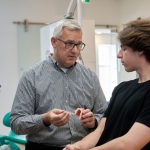As we age, our bodies undergo numerous changes, including those affecting our brain health. Neurodegenerative diseases, characterized by the progressive loss of nerve cells, become more prevalent with advancing age. Understanding these diseases is crucial for early detection, effective management, and improving quality of life for affected individuals.
Neurodegenerative diseases encompass a range of conditions that primarily affect neurons in the human brain. Among the most common are Alzheimer’s disease, Parkinson’s disease, Lewy body dementia, amyotrophic lateral sclerosis (ALS), and Huntington’s disease. Research in this field is extensive, and organizations like preclinical neurology CRO play a vital role in developing and testing new treatments to combat these debilitating conditions.
Alzheimer’s Disease
Alzheimer’s disease is the most common neurodegenerative disorder among older adults. It primarily affects memory, thinking, and behavior. Early symptoms include mild memory loss and confusion. As the disease progresses, individuals may experience severe memory impairment, disorientation, and difficulties in speaking, swallowing, and walking. The exact cause remains unknown, but a combination of genetic, environmental, and lifestyle factors is believed to play a role. Neurologists and specialists in preclinical neurology CRO are still developing effective
The Role of Amyloid Plaques and Tau Tangles
In Alzheimer’s disease, abnormal protein deposits, known as amyloid plaques, accumulate in the brain. These plaques disrupt communication between brain cells. Additionally, tau protein tangles form inside neurons, causing them to die. These changes lead to brain shrinkage and significant cognitive decline.
Parkinson’s Disease
Parkinson’s disease is another common neurodegenerative disorder that typically affects individuals over 60. It primarily impacts movement and coordination. Early signs include tremors, muscle stiffness, and bradykinesia (slowness of movement). As the disease advances, balance problems, speech difficulties, and non-motor symptoms like depression and sleep disturbances may occur.
The Role of Dopamine Deficiency
Parkinson’s disease results from the degeneration of dopamine-producing neurons in the brain. Dopamine is a neurotransmitter crucial for smooth and coordinated movements. The loss of these neurons leads to the characteristic motor symptoms of Parkinson’s disease. Treatments focus on managing symptoms through medications, lifestyle changes, and, in some cases, surgical interventions.
Lewy Body Dementia
Lewy body dementia (LBD) is a complex neurodegenerative disease characterized by the presence of abnormal protein deposits called Lewy bodies in the brain. LBD affects both cognitive and motor functions. Early symptoms include visual hallucinations, fluctuating attention, and motor symptoms similar to Parkinson’s disease. Individuals with LBD may also experience severe sleep disturbances and autonomic nervous system dysfunction.
Differentiating LBD from Other Dementias
Lewy body dementia shares some symptoms with Alzheimer’s and Parkinson’s diseases, making diagnosis challenging. However, the presence of prominent visual hallucinations and fluctuations in cognitive function can help distinguish LBD. Treatment focuses on managing symptoms, often involving medications used for both Parkinson’s and Alzheimer’s diseases.
Amyotrophic Lateral Sclerosis (ALS)
Amyotrophic lateral sclerosis, also known as Lou Gehrig’s disease, is a neurodegenerative disorder that primarily affects motor neurons. These neurons control voluntary muscle movements. Early symptoms include muscle weakness, twitching, and cramping. As ALS progresses, individuals may experience difficulty speaking, swallowing, and breathing.
The Progression and Impact of ALS
ALS progresses rapidly, leading to significant disability and, ultimately, death within a few years of diagnosis. The exact cause of ALS remains unclear, but genetic and environmental factors are believed to contribute. There is currently no cure for ALS, but treatments aim to slow disease progression and improve quality of life.
Huntington’s Disease
Huntington’s disease is a hereditary neurodegenerative disorder caused by a mutation in the huntingtin gene. It typically manifests in mid-adulthood, though juvenile cases also occur. Early symptoms include subtle changes in mood, cognition, and coordination. As the disease progresses, individuals experience involuntary movements (chorea), severe cognitive decline, and psychiatric disturbances.
Genetic Testing and Management
Genetic testing can confirm a Huntington’s disease diagnosis and identify at-risk individuals. While there is no cure, treatments focus on managing symptoms and providing supportive care. Research into disease-modifying therapies is ongoing.
Managing Neurodegenerative Diseases
Early detection and intervention are crucial for managing neurodegenerative diseases. Regular check-ups and monitoring for early symptoms can lead to timely diagnosis and treatment. Collaboration with healthcare professionals, including neurologists and specialists in preclinical neurology CRO, is essential for developing effective treatment plans.
The Importance of Lifestyle Factors
Lifestyle factors, such as a healthy diet, regular exercise, and cognitive stimulation, can play a significant role in managing and potentially slowing the progression of neurodegenerative diseases. Maintaining social connections and engaging in mentally stimulating activities can also support brain health.
Advances in Research and Treatment
Research into neurodegenerative diseases is advancing rapidly, with ongoing efforts to understand the underlying mechanisms and develop effective treatments. Emerging therapies, including gene therapies, neuroprotective agents, and innovative drug delivery systems, hold promise for improving outcomes for individuals with these conditions.
The Role of Clinical Trials
Clinical trials are essential for evaluating the safety and efficacy of new treatments. Participation in clinical trials offers patients access to cutting-edge therapies and contributes to advancing medical knowledge. Collaboration between researchers, healthcare providers, and patients is vital for the success of these trials.
Understanding and addressing neurodegenerative diseases requires a multifaceted approach, combining medical care, lifestyle modifications, and ongoing research. By staying informed and proactive, we can improve the lives of those affected by these challenging conditions.
Lynn Martelli is an editor at Readability. She received her MFA in Creative Writing from Antioch University and has worked as an editor for over 10 years. Lynn has edited a wide variety of books, including fiction, non-fiction, memoirs, and more. In her free time, Lynn enjoys reading, writing, and spending time with her family and friends.















